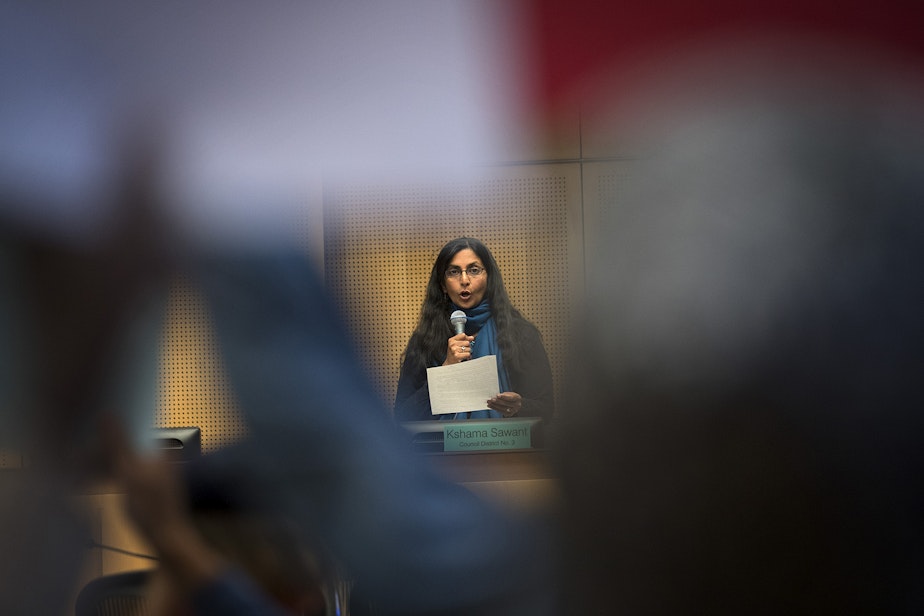Seattle candidates hustle for democracy vouchers but big money looms

Candidates say democracy vouchers are leveling the playing field to launch their campaigns. But the vouchers can’t keep big money out of their races.
Seattle voters have signed over more than $1 million in democracy vouchers so far, and the Seattle Ethics and Elections Commission has distributed $544,400 of that to City Council candidates.
The commission's director Wayne Barnett said district candidates can qualify for vouchers more easily than citywide candidates could in 2017.
“We are seeing it pay off with a record number of candidates participating in the program,” Barnett said.
Alex Pedersen and Shaun Scott are two of the candidates for Seattle City Council District 4. They differ on one of the issues: whether to upzone the Ave (that's University Way Northeast to cartographers) in the University District. Pedersen opposes an upzone and said the street distinctive businesses should be preserved. Scott supports the upzone with efforts like commercial rent control for small businesses.
That aside, the two candidates are united in their enthusiasm for the democracy voucher program. This year each Seattle resident has $100 in vouchers that they can give to candidates in the seven City Council districts.
Pedersen was the first candidate to qualify for them, while Scott has received the most of any candidate citywide so far.
Pedersen previously worked as a legislative aide to former city council member Tim Burgess.
“The democracy voucher program really encourages candidates to get out and doorbell and meet with voters,” he said.
Pedersen said even if outside groups fund negative ads later in the campaign, voters will remember his efforts. “They’ll care more about that than some hit piece they get in the mail later from a special interest group,” he said.
Scott has raised nearly $86,000 in vouchers so far. He is a Democratic Socialist who worked as a field organizer for Congresswoman Pramila Jayapal.
“The voucher program has cleared a lot of space that used to be dominated in political activity in this city by fundraising,” he said.
In exchange for the vouchers, they agree to limit their overall fundraising to $75,000 in the primary, and another $75,000 in the general. But if an opponent who isn’t seeking vouchers outspends them, or if an outside group targets them, they can get permission to raise more money as well.
Scott said it’s a good solution. “Publicly funded elections are something I stand for,” he said.
The leading fundraiser out of the seven district council races is incumbent Kshama Sawant in District 3. She likes the voucher concept in theory. “It is a very beneficial thing to many grassroots campaigns," she said.
But she’s one of the few council candidates not participating. She said she can’t afford to.
She points to Amazon’s recent $200,000 donation to a Seattle Metropolitan Chamber of Commerce political action fund. Sawant said given her support for business taxes and rent control, she expects business groups to spend heavily against her.
“If we don’t recognize the onslaught that there will be from big business against our campaign, then it is like forcing ourselves to fight the campaign with one hand tied behind our back,” she said.
About 45% of Sawant’s funding has come from outside Seattle, according to the SEEC. She said it’s another tactic more often used by pro-business candidates.
“We see corporations going across district and city boundaries," she said. "Working people have to do the same,” she said.
Sawant has currently raised $107,000. Her closest opponent, Logan Bowers, has raised $81,000. He is participating in the democracy vouchers program, so his fundraising in the primary was initially capped at $75,000. But when Sawant passed that amount, he appealed to be released him from the limit as well.
Bowers said if Sawant had joined the voucher program, it would have kept spending down for all the District 3 candidates.

“She was the only driver that could possibly invite money into the race and she could have kept it out for months,” Bowers said, as the other candidates are doing. “All of us were happy to keep big money out by our choices.”
But independent expenditures could still throw candidates a curve, even in districts where all the candidates have signed on to the voucher program.
In 2017, Teresa Mosqueda, Jon Grant and Pete Holmes all ultimately sought release from the fundraising limits because of spending by their opponents or outside groups. Holmes was released from his spending limit after the Seattle Police Officers’ Guild took out an ad against him in the Seattle Times, which was seen as benefiting Holmes' opponent Scott Lindsay.
Some candidates have said they are worried that the $150,000 spending limit for this year’s district races is too low. René LeBeau is the Democracy Voucher program manager. She said those limits were based on historical levels for city council candidates, but could change in the future.
“There is the ability to increase those spending limits, the Council does have that ability, but I think everybody’s looking for more data,” LeBeau said. Vouchers were approved by voters in a ballot measure in 2015; this is the second time they’ve been used.
Candidates said even if they are released from spending limits, as Holmes was, it could be hard to raise funds quickly enough to respond to a negative ad.
"Every day that we remain confined to the limits puts our campaign at a serious disadvantage to communicate with voters while we are being outspent by our opponent," Holmes' campaign told the elections commission.
SEEC Executive Director Wayne Barnett said that since the Citizens United Supreme Court ruling, there’s not much the city can do to curb political spending. He said he’s encouraged that so many candidates are embracing the vouchers anyway.








